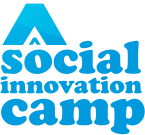Social Innovation Camp
Social Innovation Camp (SICamp) is a competition and event for software developers, designers and social innovators to create new businesses and projects that use the web to achieve a social goal. It is a method for social innovation.[1]

History
Social Innovation Camp was set up in London, in early 2008, with support from the Young Foundation and NESTA.
Social Innovation Camps have taken place:[2]
- April 2008 at the Young Foundation in Bethnal Green, London.[3]
- December 2008 at the Young Foundation in Bethnal Green, London.[4]
- June 2009 at The Saltire Centre in Glasgow, Scotland.[5]
- 8–10 August 2009 in Tbilisi, Georgia.[6]
- September 2009 in Bratislava, Slovakia.[6]
- 5–7 March 2010 in Sydney, Australia.[7]
- 26–28 March 2010 at the Young Foundation in Bethnal Green, London.[8]
- 18–19 September 2010, Baku, Azerbaijan.[9]
- 17–19 June 2011 in Seoul, South Korea.[10]
- January 2011 in Lagos, Nigeria.[7]
- 12–14 November 2010, Prague, Czech Republic.[7]
- 18–19 September 2010, Lagos, Nigeria.[7]
- 27–29 May 2011, in Kyrgyzstan.[7]
- 18–20 June 2011 at The Informatics Forum in Edinburgh, Scotland.[11]
- 18–20 June 2011 in Seoul, South Korea.[12]
- July 23–24, 2011, Baku, Azerbaijan[13]
- November 18–20, 2011, Yerevan, Armenia.[14]
- May 10–12, 2013, Oslo, Norway.[15]
Winners
- The winning project from the first event was Enabled By Design.
- The winning project from the second camp was The Good Gym.
- The winning project from the third camp was MyPolice.
- The winning projects from the 8th camp were Yollar.info (project about transports in Baku) and Temizsaxlayaq.com (project about environment protection).[16]
International Camps
The Social Innovation Camp model has been replicated in Australia, Slovakia, South Korea, Georgia, Armenia, Czech Republic, Nigeria, Kyrgyzstan and Azerbaijan.[17]
"Transitions Online" organized the Social Innovation Camp in Azerbaijan (July 23–24, 2011).[13] Organisers for International Social Innovation Camps include Soros Foundation, The Hope Institute, IREX, UNDP, Internews, The Eurasia Partnership Foundation, World Wide Narrative and others.
Media interest
Social Innovation Camps have been featured by a number of media outlets including The Guardian.[18]
See also
- Social Innovation
- Young Foundation
- Transitions Online
References
- "Publications". Nesta.org.uk. Retrieved 2016-07-18.
- "Archived copy". Archived from the original on 2011-08-10. Retrieved 2011-06-25.CS1 maint: archived copy as title (link)
- "Archived copy". Archived from the original on 2011-12-06. Retrieved 2011-11-28.CS1 maint: archived copy as title (link)
- "Archived copy". Archived from the original on 2011-07-27. Retrieved 2011-07-08.CS1 maint: archived copy as title (link)
- "Archived copy". Archived from the original on 2011-10-27. Retrieved 2011-11-28.CS1 maint: archived copy as title (link)
- "Archived copy". Archived from the original on 2011-07-28. Retrieved 2011-07-08.CS1 maint: archived copy as title (link)
- "Archived copy". Archived from the original on 2010-04-09. Retrieved 2010-04-29.CS1 maint: archived copy as title (link)
- "Archived copy". Archived from the original on 2011-10-27. Retrieved 2011-11-28.CS1 maint: archived copy as title (link)
- "Archived copy". Archived from the original on 2011-11-19. Retrieved 2011-11-30.CS1 maint: archived copy as title (link)
- "Archived copy". Archived from the original on 2011-05-02. Retrieved 2011-05-10.CS1 maint: archived copy as title (link)
- Archived 2011-11-24 at the Wayback Machine
- "Archived copy". Archived from the original on 2013-05-11. Retrieved 2013-07-29.CS1 maint: archived copy as title (link)
- "Archived copy". Archived from the original on 2011-07-28. Retrieved 2011-07-10.CS1 maint: archived copy as title (link)
- "Caucasus: Social Innovation Camp · Global Voices". Globalvoices.org. 2010-04-19. Retrieved 2016-07-18.
- "Social innovation camp | Technology". The Guardian. Retrieved 2016-07-18.
External links
- Main Social Innovation Camp website
- Social Innovation Camp Azerbaijan (english version)
- Social Innovation Camp Central Eastern Europe
- Social Innovation Camp Australia
- Social Innovation Camp Caucasus
- Social Innovation Camp Korea
- Social Innovation Camp Norway
- The Young Foundation
- The Good Gym
- Enabled by Design
- MyPolice
- NESTA
- Transitions website